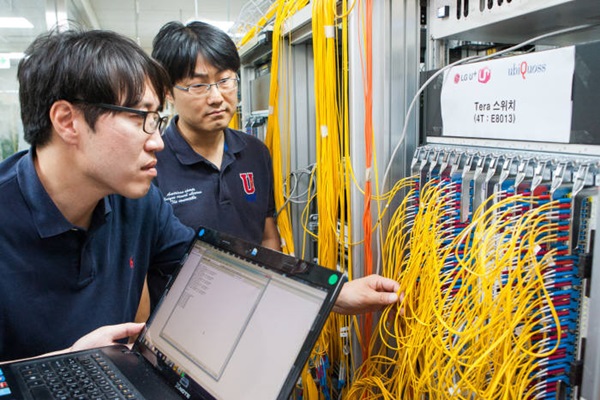One small company succeeded in domestically producing large-capacity communication equipment, which Korean companies relied on foreign companies for more than 20 years, and nearing actual placement of that equipment. It is being seen as uprising of Korean communication equipment businesses that were estimated as being businesses that knew how to make small and cheap products. It is receiving more attention in a sense that this was a result of a combination of technologies from a small company and funds from a huge company.
Ubiquoss (CEO Lee Sang Geun) announced on the 3rd that it is planning to finalize its field test of 4 TB Internet Exchange Equipment (L3 Switch) by end of this month. If it receives approval after tests, it will deliver about 100 of that equipment to LG Uplus. Foreign price of this equipment goes well over $171,000 (200 million KRW), and it is expected that import substitution effect of $17.1 million (20 billion KRW) will take place with just one deliver.
This equipment is Korea’s first that has an ability to send 4 TB data and its capacity is the biggest out of all communication equipment that was developed until now. 1 TB is equal to 1024 GB that makes 4 TB equal to 4096 GB, and it is possible to process about 2,700 HD (1.5 GB) movies at once.
Wired-communication network can be divided into ‘Member Network – Exchange Network – Transmission Network’ depending on functions and amount of information sent. Amount of information sent and functions become more complicated as it leans towards transmission network. If this network can be compared to river, Member Network can be seen as tributary and Transmission Network can be seen as main stream. Rate of domestically producing equipment for Transmission Network and Exchange Network is lower as they require high level of technologies.

According to ‘Investigation of Actual Condition of Network Equipment Industry’ that was published by Korea Communications Commission 70 in 2013, 37.4% of transmission equipment depends on imports. Although most of inexpensive medium to small-sized exchange equipment (L2 Switch, IP-PBX, and others) is being domestically produced, foreign Cospec L3 Switch and routers are being used.
Equipment that Ubiquoss developed is part of L3 Switch for Exchange Network, but it can also be used for Edge Router due to its advanced technology level compared to simple switch equipment. If there are no problems with applying this equipment to Edge Router, Ubiquoss is planning to apply it also on Core Router.
This development is also receiving lots of attention that Ubiquoss suggested ‘Localization of Communication Equipment’ successful model as huge company gave big help in developing this technology.
As LG Uplus offered development of TB-like switch equipment to Ubiquoss in 2013, it led win-win growth by offering shocking terms such as development expense, manpower, and even amount of purchase. Due to its contribution of co-developing 10 GB Switch with Ubiquoss and Dasan Networks in 2012, it was selected as a model company in win-win growth by Fair Trade Commission in middle of last month.
“Korea’s medium to small-sized businesses had difficulties in competing against huge global communication companies until now due to their inadequate resources. By making Ubiquoss-LG Uplus as a prime example, there needs to be more expansion of co-existence model that combines huge companies’ funds and medium to small-sized companies’ technologies.” Professor Yang Jae Soo of Dankook University’s Electronic Electric Engineering Department said that there needs to be more cooperation between huge companies and medium to small-sized companies.
Staff Reporter Kim, Yongjoo | kyj@etnews.com